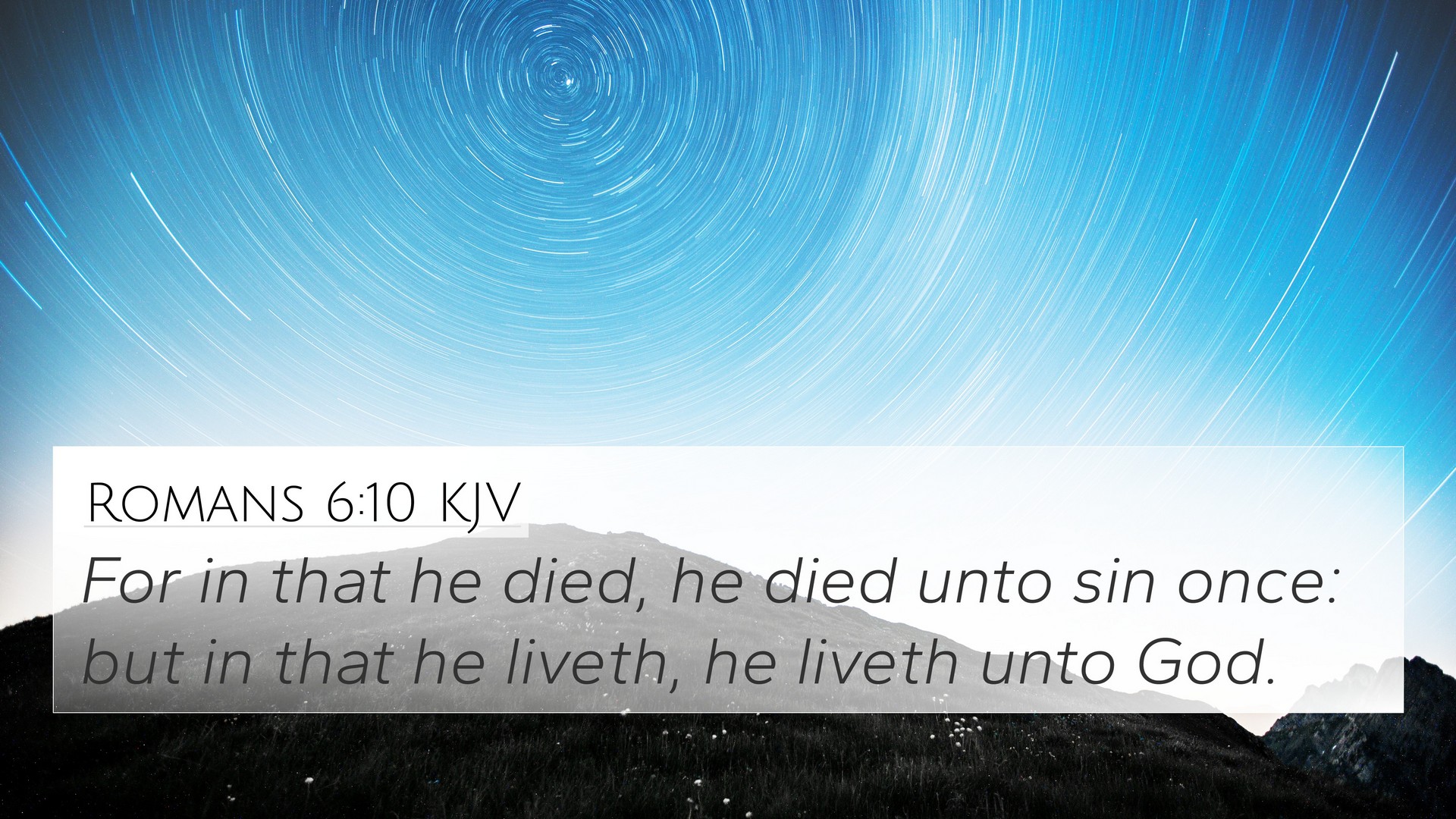Old Testament
Genesis Exodus Leviticus Numbers Deuteronomy Joshua Judges Ruth 1 Samuel 2 Samuel 1 Kings 2 Kings 1 Chronicles 2 Chronicles Ezra Nehemiah Esther Job Psalms Proverbs Ecclesiastes Song of Solomon Isaiah Jeremiah Lamentations Ezekiel Daniel Hosea Joel Amos Obadiah Jonah Micah Nahum Habakkuk Zephaniah Haggai Zechariah MalachiRomans 6:10 Similar Verses
Romans 6:10 Cross References
For in that he died, he died unto sin once: but in that he liveth, he liveth unto God.
Uncover the Rich Themes and Topics of This Bible Verse
Listed below are the Bible themes associated with Romans 6:10. We invite you to explore each theme to gain deeper insights into the Scriptures.
Romans 6:10 Cross Reference Verses
This section features a detailed cross-reference designed to enrich your understanding of the Scriptures. Below, you will find carefully selected verses that echo the themes and teachings related to Romans 6:10 KJV. Click on any image to explore detailed analyses of related Bible verses and uncover deeper theological insights.

2 Corinthians 5:21 (KJV) »
For he hath made him to be sin for us, who knew no sin; that we might be made the righteousness of God in him.
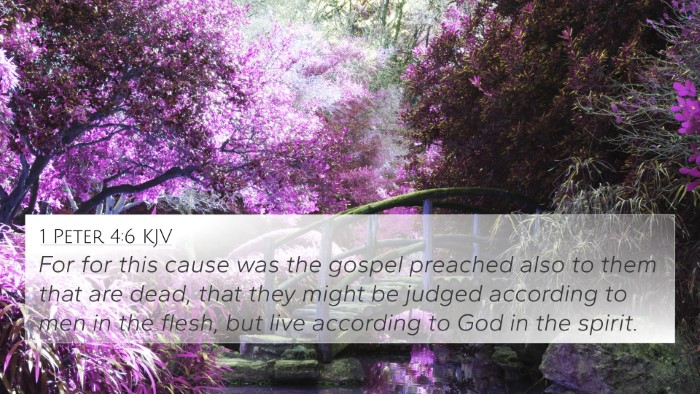
1 Peter 4:6 (KJV) »
For for this cause was the gospel preached also to them that are dead, that they might be judged according to men in the flesh, but live according to God in the spirit.
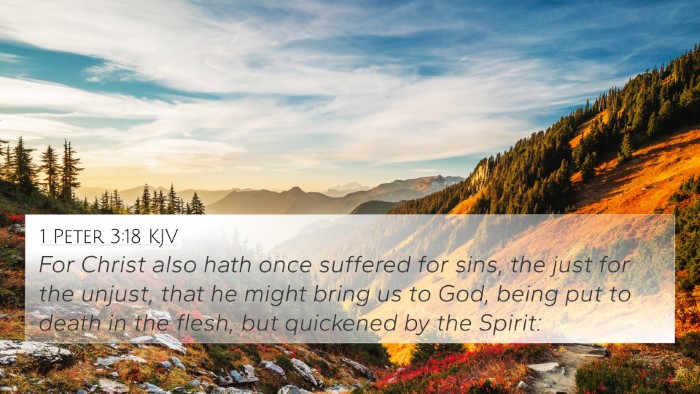
1 Peter 3:18 (KJV) »
For Christ also hath once suffered for sins, the just for the unjust, that he might bring us to God, being put to death in the flesh, but quickened by the Spirit:
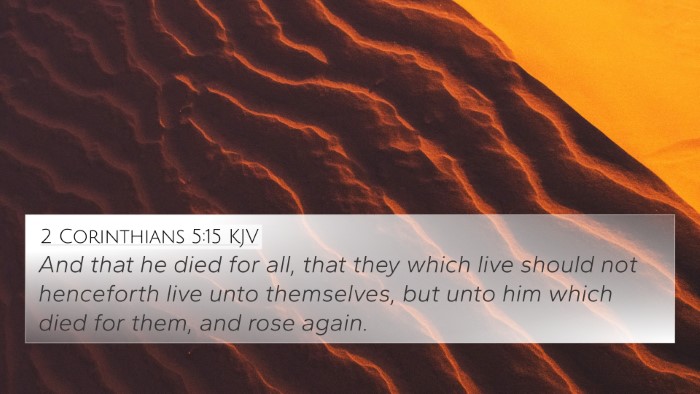
2 Corinthians 5:15 (KJV) »
And that he died for all, that they which live should not henceforth live unto themselves, but unto him which died for them, and rose again.
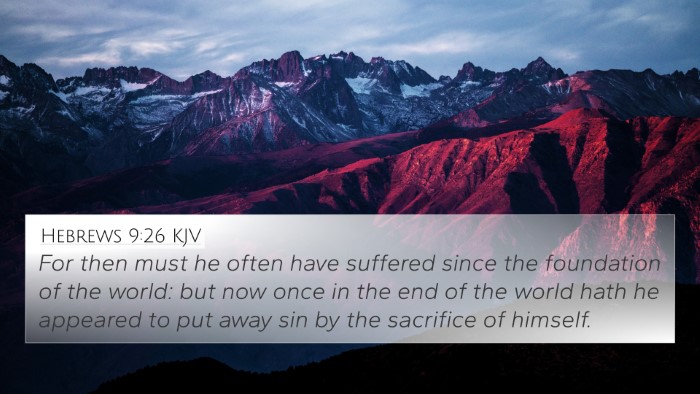
Hebrews 9:26 (KJV) »
For then must he often have suffered since the foundation of the world: but now once in the end of the world hath he appeared to put away sin by the sacrifice of himself.
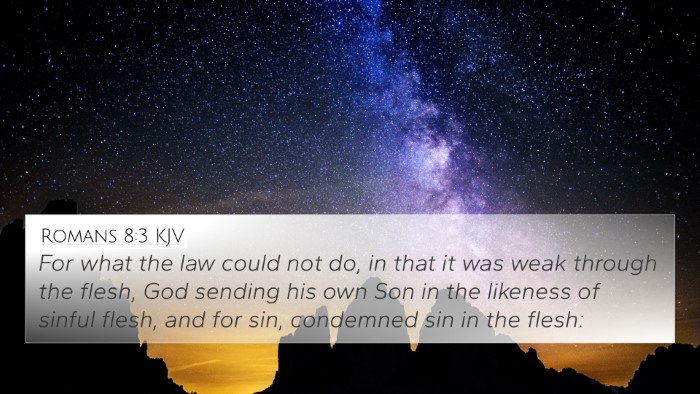
Romans 8:3 (KJV) »
For what the law could not do, in that it was weak through the flesh, God sending his own Son in the likeness of sinful flesh, and for sin, condemned sin in the flesh:

Romans 6:11 (KJV) »
Likewise reckon ye also yourselves to be dead indeed unto sin, but alive unto God through Jesus Christ our Lord.
Romans 6:10 Verse Analysis and Similar Verses
Understanding Romans 6:10
Romans 6:10 states: "For in that He died, He died unto sin once: but in that He liveth, he liveth unto God."
This verse encapsulates profound theological truths about the death and resurrection of Jesus Christ, highlighting the significance of His sacrifice and the implications for believers.
Summary of Insights from Public Domain Commentaries
Matthew Henry's Commentary
Matthew Henry emphasizes that Christ's death was not a repeated event but a singular, perfect sacrifice for sin. By dying once, He fulfilled the Law's requirement for atonement, making it unnecessary to sacrifice repeatedly for humanity's sins. Furthermore, His resurrection signifies a new life wherein He lives for God's glory, establishing a model for believers to follow in their own lives.
Albert Barnes' Commentary
Albert Barnes elucidates Paul's assertion that Jesus' death was definitive and effective against sin. The phrase "He died unto sin" indicates that Christ took upon Himself the consequences of sin, thereby defeating death. His ongoing life represents not just resurrection but also a constant alignment with the will of God, urging believers to likewise live a life dedicated to righteousness.
Adam Clarke's Commentary
Adam Clarke reflects on the transformative power of Christ's resurrection. He notes that by living unto God, Jesus exemplifies a life led by divine purpose, starkly contrasting the sinner's life. Clarke asserts that believers are invited into this new existence, indicating that they too must consider themselves dead to sin and alive in righteousness.
Key Themes
This verse touches on several critical themes in Christian theology, including:
- Once for All Sacrifice: The sufficiency of Christ’s death as a singular atonement.
- Living in Resurrection: The concept of life in Christ post-resurrection, which offers hope and a new identity.
- Sin and Righteousness: The relationship between Jesus' victory over sin and the believer's call to live righteously.
Bible Cross-References
Romans 6:10 is well-connected with the following Bible verses:
- Hebrews 7:27: "Who needeth not daily, as those high priests, to offer up sacrifice, first for his own sins, and then for the people's: for this he did once, when he offered up himself."
- 1 Peter 3:18: "For Christ also hath once suffered for sins, the just for the unjust, that he might bring us to God..."
- Romans 5:8: "But God commendeth his love toward us, in that, while we were yet sinners, Christ died for us."
- Colossians 3:1-3: "If ye then be risen with Christ, seek those things which are above..."
- Galatians 2:20: "I am crucified with Christ: nevertheless I live; yet not I, but Christ liveth in me..."
- John 10:10: "I am come that they might have life, and that they might have it more abundantly."
- 2 Corinthians 5:17: "Therefore if any man be in Christ, he is a new creature: old things are passed away; behold, all things are become new."
- Romans 8:34: "Who is he that condemneth? It is Christ that died, yea rather, that is risen again..."
- 1 John 2:2: "And he is the propitiation for our sins: and not for ours only, but also for the sins of the whole world."
- Philippians 3:10: "That I may know him, and the power of his resurrection, and the fellowship of his sufferings..."
The Importance of Cross-Referencing
Understanding the connections between Bible verses can deepen theological comprehension and promote a holistic view of Scripture. Cross-referencing can assist in:
- Identifying thematic similarities and differences.
- Enhancing sermon preparation with Scripture support.
- Guiding personal Bible study to uncover broader scriptural insights.
Conclusion
Romans 6:10 serves as a cornerstone for understanding the redemptive work of Christ and the believer's new identity in Him. Through the lens of these commentaries and cross-references, one can appreciate the profundity of this verse as it relates to the broader narrative of the Gospel.
Utilizing tools for Bible cross-referencing can enrich personal study and reveal how interconnected the Scriptures are, thus fostering a deeper appreciation for God's Word.
